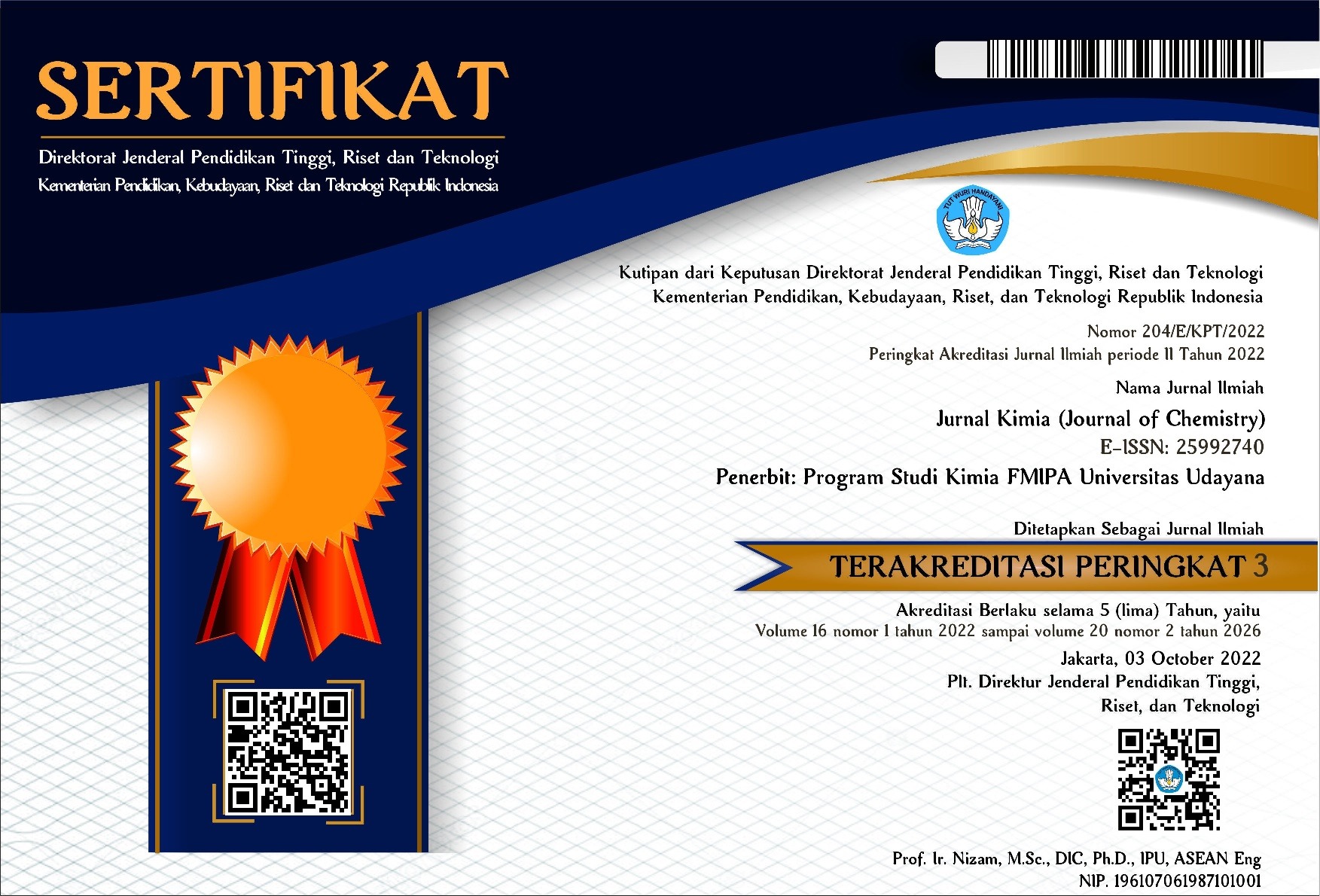IDENTIFIKASI DAN UJI AKTIVITAS ANTIBAKTERI EKTRAK ETANOL KULIT DAUN LIDAH BUAYA TERHADAP BAKTERI Eschericia coli DAN Staphylococcus aureus
Abstract
Telah dilakukan penelitian untuk mengidentifikasi senyawa aktif Antibakteri dari kulit daun Aloe vera. Penelitian dilakukan dengan mengekstrak 200g sampel kering kulit daun lidah buaya dengan cara maserasi menggunakan pelarut etanol selama 24 jam, kemudian pelarutnya diuapkan dengan rotary vacuum evaporator. Ekstrak kental yang diperoleh selanjutnya dipisahkan menggunakan kromatografi kolom dengan fasa diam silika gel dan fasa gerak n-heksana, etil asetat, dan etanol. Fraksi yang diperoleh kemudian diuji aktivitas antibakteri nya terhadap bakteri Escherichia coli dan staphylococcus aureus. Fraksi yang paling aktif kemudian dimurnikan dengan kromatografi kolom dan dilakukan identifikasi senyawa aktifnya dengan GC-MS. Hasil uji diperoleh bahwa fraksi n-heksan memiliki aktivitas antibakteri terbaik yang ditunjukkan dengan nilai zona hambat sebesar 12 mm terhadap E.coli dan 5 mm terhadap S. aureus. Hasil analisis senyawa dengan menggunakan GC MS diperoleh senyawa seperti: 1-metildodesilamin; 4-[2-(fenilsulfanil)etil] piridin; pentanal ; difenilefrin ; p-hidroksinorefedrin dan 5-(2-aminopropil)-2-metilfenol
Kata kunci: Aktivitas antibakteri, Escherichia coli, lidah buaya, maserasi, Staphylococcus aureus.
ABSTRACT
This research was carried out to identify the active anti-bacterial compounds from aloe vera leaf skin. The study was conducted by extracting 200 grams of dried Aloe vera leaves skin using the maceration method with ethanol for 24 hours, then the solvent was evaporated using the rotary vacuum evaporator. The viscous extract obtained was then separated by column chromatography with a stationary phase of silica gel and a mobile phase of n-hexane, ethyl acetate, and ethanol. The obtained fractions were tested for their anti-bacterial activities against Escherichia coli and Staphylococcus aureus bacteria. The most active fraction was purified by column chromatography, and then the active compound was identified by GC-MS. The results showed that the n-hexane fraction had the best anti-bacterial activity, with an inhibition zone of 12 mm against E.coli and 5 mm against S. aureus. The results of compound analysis using GC-MS obtained compounds are 1-methyl dodecyl amine, 4-[2-(phenyl sulfonyl)ethyl] pyridine, pentanal, p-hydroxynorephedrine, 5-(2-aminopropyl)-2-methylphenol, di-phenylephrine.
Keywords: Aloe vera leaf, antibacterial activity, Escherichia coli, maceration, Staphylococcus aureus
Downloads
References
Bashir, A., Saeed, B., Mujahid, T. Y., Jehan, N. 2011. Comparative study of antimicrobial activities of Aloe vera extracts and antibiotics against isolates from skin infections. African Journal of Biotechnology, 10(19).
Handayani, G. N. 2019. Uji Aktivitas Ekstrak Etanol Daun Lidah Buaya (Aloe Vera) Terhadap Penghambatan Pertumbuhan Staphylococcus aureus Dan Candida albicans. Biosel: Biology Science and Education, 8(1). https://doi.org/10.33477/bs.v8i1.841
Ikalinus, R., Widyastuti, S., Eka Setiasih, N. 2015. Skrining Fitokimia Ekstrak Etanol Kulit Batang Kelor (Moringa Oleifera). Indonesia Medicus Veterinus, 4(1).
Lamba, A. 2007. Antimicrobial activities of aldehydes and ketones produced during rapid volatilization of biogenic oils. Missouri University of Science and Technology, Masters Theses.
Lingga, A. R., Pato, U., & Rossi, E. 2016. Uji Antibakteri Ekstrak Batang Kecombrang (Nicolaia Speciosa Horan) Terhadap Staphylococcus Aureus dan Escherichia Coli. 3(1), 1–15.
Octaviani, M., Fadhli, H., & Yuneistya, E. 2019. Uji Aktivitas Antimikroba Ekstrak Etanol dari Kulit Bawang Merah (Allium cepa L.) dengan Metode Difusi Cakram Antimicrobial. Pharmaceutical Sciences and Research, 6(1).
Pelczar, M. J. 2005. Dasar-dasar Mikrobiologi Jilid 1. Jakarta: Universitas Indonesia.
Pratiwi, Rina. H. 2017. Mekanisme Pertahanan Bakteri Patogen terhadap Antibiotik. Journal Pro-Life, 4(2).
Prayoga, E.G.D, Nocianitri, Puspawati. 2019. Identifikasi Senyawa Fitokimia dan Aktivitas Antioksidan Ekstrak Kasar Daun Pepe (gymnema reticulatum br.) pada Berbagai Jenis Pelarut. Jurnal Ilmu dan Teknologi Pangan 8(2), 111-121.
Puteri, T., Milanda, T., Raya, J.2016. Uji Daya Hambat Ekstrak Daun Lidah Buaya (Aloe vera L.) Terhadap Bakteri Escherichia coli dan Staphylococcus aureus. Farmaka (Vol. 14, Issue 2).
Rahardjo, M., Koendhori, E. B., Setiawati, Y. 2017. Uji Aktivitas Antibakteri Ekstrak Etanol Lidah Buaya (Aloe vera) Terhadap Bakteri Staphylococcus aureus. Jurnal Kedokteran Syiah Kuala, 17(2).
Rajeswari, R., Umadevi, M., Rahale, C. S., Pushpa, R., Selvavenkadesh, S., Kumar, K. P. S., Bhowmik, D. 2012. Aloe vera: the miracle plant its medicinal and traditional uses in India. Journal of Pharmacognosy and Phytochemistry, 1(4), 118–124.
Safitri, L., Susilorini, T. E., Surjowardojo, P. 2017. Evaluasi Aktivitas Antimikroba (Streptococcus agalactiae) Menggunakan Exstrak Buah Mahkota Buah (Phaleria macrocarpa L.) dengan Pelarut yang Berbeda. Jurnal Ilmu Dan Teknologi Hasil Ternak (JITEK), 12(1), 8–15.
Sangi, M., Runtuwene, M. R. J., Simbala, H. E. I. 2008. Analisis Fitokimia Tumbuhan Obat Di Kabupaten Minahasa Utara. Chemistry Progress, 1(1): 47-53.
Simaremare, E. S. 2014. Skrining Fitokimia Ekstrak Etanol Daun Gatal (Laportea decumana (Roxb.) Wedd). Pharmacy, 11(01).
Wakhidah, A. Z., Pratiwi, I., Azzizah, I. N. 2017. Studi Pemanfaatan Tumbuhan Sebagai Bahan Obat Oleh Masyarakat Desa Marimabate di Kecamatan Jailolo, Halmahera Barat. Jurnal Pro-Life, 4(1).
Welsh, K. J., Abbott, A. N., Lewis, E. M., Gardiner, J. M., Kruzel, M. C., Lewis, C. T., Mohr, J. F., Wanger, A., Armitige, L. Y. 2010. Clinical characteristics, outcomes, and microbiologic features associated with methicillin-resistant Staphylococcus aureus bacteremia in pediatric patients treated with vancomycin. Journal of Clinical Microbiology, 48(3), 894–899.

This work is licensed under a Creative Commons Attribution 4.0 International License





